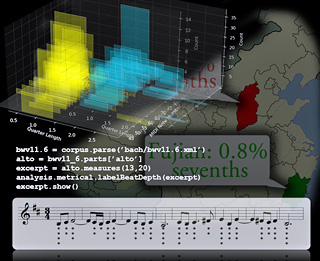Course Description
The disciplines of music history and music theory have been slow to embrace the digital revolutions that have transformed other fields’ text-based scholarship (history and literature in particular). Computational musicology opens the door to the possibility of understanding—even if at a broad level—trends and …
The disciplines of music history and music theory have been slow to embrace the digital revolutions that have transformed other fields’ text-based scholarship (history and literature in particular). Computational musicology opens the door to the possibility of understanding—even if at a broad level—trends and norms of behavior of large repertories of music. This class presents the major approaches, results, and challenges of computational musicology through readings in the field, gaining familiarity with datasets, and hands on workshops and assignments on data analysis and “corpus” (i.e., repertory) studies. Class sessions alternate between discussion/lecture and labs on digital tools for studying music. A background in music theory and/or history is required, and experience in computer programming will be extremely helpful. Coursework culminates in an independent research project in quantitative or computational musicology that will be presented to the class as a whole.
Course Info
Instructor
Departments
Topics
Learning Resource Types
notes
Lecture Notes
assignment
Problem Sets
grading
Projects with Examples
assignment_turned_in
Written Assignments with Examples

This course explores a range of methods used in computational musicology. (Image by Prof. Michael Cuthbert.)










